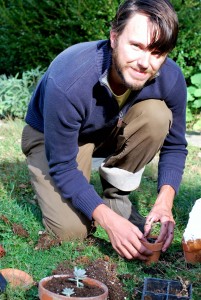Ben Sedlins, class of 2009, was part of one of the original farm crews at Dickinson College. Inspired by a friend to get involved, Ben found something beyond just agricultural work at the farm.
Having grown up with a father that works in international studies, Ben had traveled around a lot and moved for his father’s work. He chose to major in International Studies at Dickinson, focusing on post-colonialism. Following graduation, he and his brother left for New Zealand, spending four months farming with the WWOOF (World-Wide Opportunities on Organic Farms) program.
Upon returning to the US, Ben was conflicted. He felt that he had two minds: one that was directed towards work in international studies, and one that wanted more involvement in agriculture. He spent a full nine months working two part time jobs, spending half the week in DC at a desk job and half the week working on a vineyard. Eventually, the vineyard won out. Nowadays he is working for Fabbioli Cellars, managing vineyards and the production teams. When I spoke with him, he was working on creating a new vineyard that he described as his own project. The part of Virginia that he comes from is an up-and-coming area for wine production, so there has been plenty to do and explore.
When asked how his experience at the Dickinson College farm impacted his undergraduate experience, he replied, “Oh man… So many ways.” In terms of his current work, he said that working in agriculture during college nudged him towards agriculture and made him think, “I could probably do it.” He had built skills in taking care of plants and working with tractors, essential things for his current job. Beyond practical education, the farm did amazing things for him in other ways. According to Ben, the farm attracts interesting people that wouldn’t otherwise be brought together. He appreciated being able to pick tomatoes while discussing world peace with fellow students. Later in life, he found himself writing a lot about his time at the farm and what it was able to offer him as an intersection of practical skills and meaningful human interaction. Matt and Jenn, he said, are inspirational as bosses and people, and if you spend enough time around them, some things can rub off on you. In fact, his advice to current students was, “Listen to whatever Jenn and Matt tell you.”
Now that Ben is in the vineyard industry, he sees the unique position that the college farm is able to offer its students. While being heavily focused on production, the farm is also intended as an educational institution, and there are times when choices are made based on this fact, rather than the bottom line that other small-scale farmers have to consider when making ends meet. Overall, Ben really believes that the farm allows you to get out of it what you put into it.
In his current line of work, he has found some true beauty in the production of agricultural goods. Wine, more so than crops like lettuce and tomatoes, is a product that comes together over months or even years, and according to Ben, you can taste a year of work in one sip. He appreciates the delayed enjoyment of the product, considering immediate gratification is the norm in our culture. He loves being able to see the fruit of his labors (figurative and literal) in his work, and the time outside is rewarding.
As a young employee of the agricultural industry, Ben has enough insight to be able to share a few motivating words for those of us wanting to have careers in the field. Despite the many barriers in beginning a farm – high land prices, hefty capital investments, volatile weather conditions – there is a burgeoning market ready and willing to purchase produce made organically and sustainably. Following the words of a previous boss, you have to “bird-dog it,” meaning you keep at it despite any and all setbacks. When some people lose heart, you have to keep fighting for your niche.
